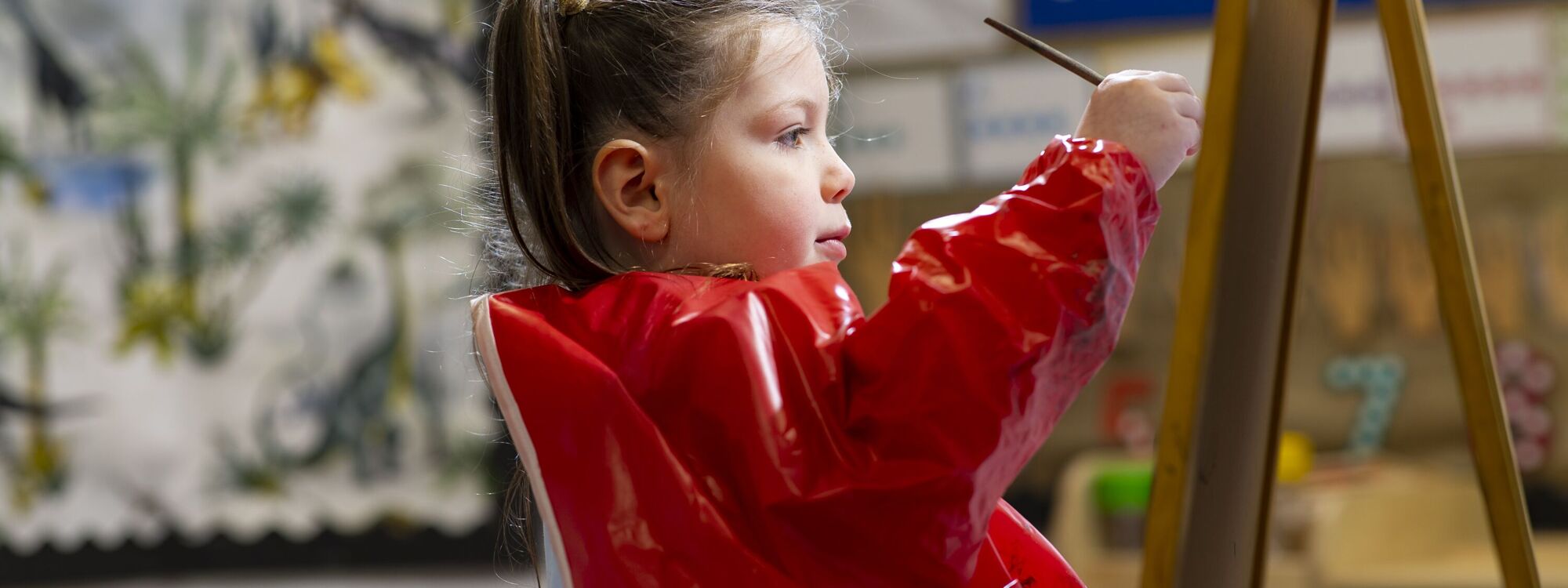|
EYFS staff introduce a new topic to provide inspiration for learning, whilst providing the flexibility for children to follow their own interests and ideas. Children learn through a balance of child-initiated and adult-directed activities. Children are provided with plenty of time to engage in ‘exploration’ throughout the variety of experiences carefully planned to engage and challenge them in the provision. The curriculum is planned for the inside and outside classrooms and equal importance is given to learning in both areas.
English / Literacy
Reading is at the heart of our curriculum and our aim is to encourage a love of reading right from the start. We have carefully selected our texts for each half term. The aim is to expose children to a range of books that not only develop a love of reading but have been chosen specifically to develop their communication and language, vocabulary and comprehension. These books will be embedded in our provision through activities, adult led sessions and on display for children to access independently. Through this, children begin to internalise new vocabulary, language patterns and begin to retell stories.
Phonics
We follow the Read, Write, Inc. programme to ensure consistency across the school. When children join us from nursery, we focus on developing children's speaking and listening skills which lay the foundations for the phonics work. This ensures children are attuned to the sounds around them and ready to begin developing oral blending and segmenting skills, prior to GPC.
Children are encouraged to read at home and are listened to regularly in school. They are given books that match their phonic knowledge for them to apply their learning with the aim of becoming successful, confident, and fluent readers.
Mathematics
In Reception, we follow the White Rose Maths Scheme of work. High quality learning environments and meaningful interactions with adults, support children in developing mathematical thinking and discussion. Pupils learn through games and tasks using concrete manipulatives and pictorial structures and representations which are then rehearsed applied and recorded within their own child-led exploration.
In Reception, children develop a love of maths through games, songs, rhymes, and play using concrete manipulatives. There is a focus on the following counting principles; one to one correspondence, stable order and cardinal principle.
Wider Curriculum
Our wider curriculum is taught through the learning areas; UtW and EAD. EYFS staff have a good understanding of how ELG’s feed into the National Curriculum through our robust planning and CPD opportunities. In reverse, colleagues throughout the school are also aware of the key ELG’s that link to each foundation subject and the progression of the subject.
Exciting, purposeful and contextual activities are planned to build on children’s natural curiosity. For example, building a boat for the lost penguin from Lost and found by Oliver Jeffers enabled them to think like a ‘Scientist’, ‘Engineer’ as they explore a range of materials and test out their own ideas.
Building further on our communication and language focus, children will be encouraged to employ subject specific language and terminology in foundation subjects, and such vocabulary will be modelled, both verbally and orally, by supporting practitioners.
Our inclusive approach means that all children learn together, but we have a range of additional intervention and support for children who may not be reaching their potential or are showing a greater depth of understanding and need further challenge. This includes, for example, sessions for developing speech and language, social skills, fine motor skills, phonics, and mathematics.
|
Assessment (Impact)
|
|
Learning is captured through:
Baseline:
The RBA (Statutory Reception Baseline Assessment)
NELI (Nuffield Early Language Intervention)
Ongoing Observation:
All ongoing observations are used to inform weekly planning and identify children’s next steps. This formative assessment does not involve prolonged periods of time away from the children and excessive paperwork. Practitioners draw on their knowledge of the child and their own expert professional judgements through discussions with other practitioners, photographs and physical examples such as a child’s drawing / making.
Assessment:
Phonic assessments are carried out using phonics Tracker and Read, Write Inc assessment every half term to quickly identify pupils that are not making expected progress. Our aim is for children to ‘keep up’ rather than ‘catch up’ where possible. Assessments are completed three times per year and shared with parents, whereby the Class Teacher updates the progress children have made.
In Summer Term 2, the EYFSP is completed where the teacher judges whether the child have met each of the 17 ELG’s. They will be assessed as either ‘emerging’ or ‘expected.’ Whilst there is no judgement to state if a child is exceeding beyond an ELG, teachers, have a duty to provide a narrative for both parents and the Year 1 teacher. Impact is also evident through our successful transitions into Year 1.
Current gaps in learning are:
EYFS:
Number
-
It has been identified that children did not have a deep understanding of number to 10, including the composition of each number.
-
Subitising.
-
Verbally count beyond 20, recognising the pattern of the counting system.
|
|
